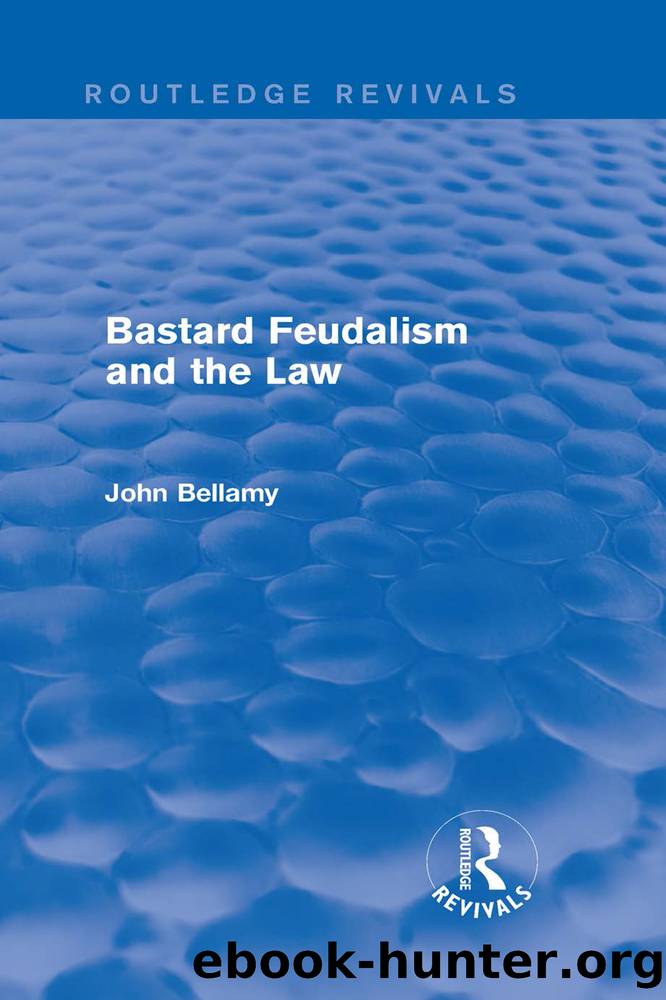Bastard Feudalism and the Law (Routledge Revivals) by John Bellamy;

Author:John Bellamy; [Bellamy, John]
Language: eng
Format: epub
ISBN: 9781134672585
Publisher: Taylor & Francis (Unlimited)
Published: 2022-01-15T00:00:00+00:00
Chapter Five The Search for Royal Favour
DOI: 10.4324/9781315883625-5
For the member of the upper classes, who in the land wars was unable to take or keep what he took to be rightfully his on account of the power his opponent wielded in that part of the country, it was an attractive strategy to seek to outflank him by gaining support at the highest level, that is to say from the king, the ultimate source of good lordship. Those who might roar like lions in their own locality were not necessarily influential at Court as everyone knew. Furthermore, royal favour shifted periodically and the king, if approached in the right manner, might be ready to do a powerful man a bad turn and the supplicant a good one. Magnatial rank did not necessarily ensure royal sympathy against an adversary of meaner status.
To supplicate to the king usually meant to go to Court. In essence, the Court was the social side of the activities of the king's (and the queen's) household in which the high-ranking members of those households were joined by the king's ministers (when present) and by those of the upper classes currently staying in that milieu. The king's household, which in the later fifteenth century probably numbered 500 or 600 persons holding positions, provided for the daily necessities of the king and the Court in the form of sustenance and valeting. Periodically the English kings issued ordinances to regulate their households, as for example in 1318, 1445, 1471â2, 1526, and 1604.1 The intention was to define the duties of all those who held posts there, to set a total establishment in order to eliminate the tendency for numbers continually to increase, and to ensure all departments accounted with the countinghouse. Although we might hope to find in the ordinances information which would throw light on the functioning of the Court in the period under review, in fact they provide relatively few insights because they deal primarily with household affairs âbelow stairsâ and not with upper-class life in and around the royal chamber. By the early fourteenth century, the chamber was where the king withdrew to dine and thus where he spent most of his time. The prime importance of the chamber in the Court life of the fifteenth century is demonstrated by reference in the Black Book of Edward IV's reign to the âinnerâ and the âutterâ chamber, the former being, no doubt, what was commonly called the privy chamber under the Tudors.2
Those who held appointments in the inner or privy chamber were of major importance in the functioning of the Court. Technically they were members of the household, which had in addition another role of importance. Persons of the upper classes who came to Court and stayed for any length of time sought not infrequently to obtain for their servants room and rations there beyond what was allowed, an abuse which was indeed one of the causes of the formulation of the household ordinances. These were full of references to bouche au court, as it was known, the lodging allowance of bread, wine, clothing, and fuel.
Download
This site does not store any files on its server. We only index and link to content provided by other sites. Please contact the content providers to delete copyright contents if any and email us, we'll remove relevant links or contents immediately.
Darach by RJ Scott(325)
How to Interpret the Constitution by Cass R. Sunstein;(269)
Bastard Feudalism and the Law (Routledge Revivals) by John Bellamy;(242)
A History of the Hundred Years War by Ephraim Emerton(223)
Waiting to Inhale by Akwasi Owusu-Bempah & Tahira Rehmatullah(149)
Women in Charge by Marisa Silvestri(116)
Innovation, Investment and Intellectual Property in South Korea by Ruth Taplin(114)
Christian Nationalism and the Birth of the War on Drugs by Andrew Monteith(111)
The Waiting Wall by Administrator(64)
Understanding Contract Law by Richard Austen-Baker Qi Zhou(57)
Exploring Careers in Cybersecurity and Digital Forensics by Lucy K. Tsado;Robert Osgood;(44)
Legal Environment of Business by Henry Cheeseman(29)
